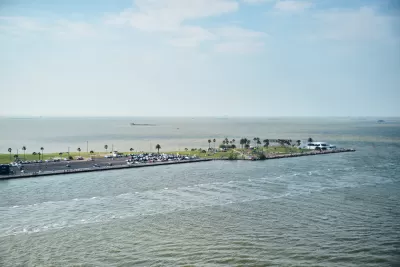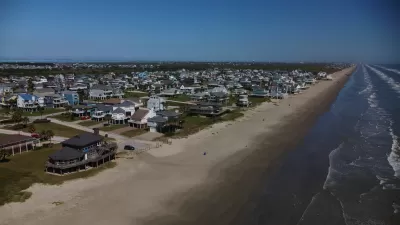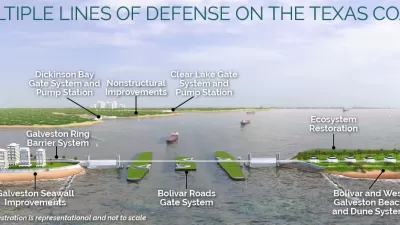Ongoing research into the loss of coastal property assets has been expanded to the state of Texas.

Perla Trevizo shares the findings of a study by First Street Foundation and Columbia University that calculates the cost of sea level in 18 other coastal states. Trevizo focuses on Texas for the Houston Chronicle after researchers added Texas property data to its expanding dataset.
The bad news: Homeowners have already lost $76.4 million in potential property value, with the biggest losses coming in Galveston.
Using a combination of real estate transactions and tidal flooding exposure, [the study] found that from 2005 to 2017, homes in Galveston lost $9.1 million in potential value, followed by Jamaica Beach (which lost $8.6. million) and the Bolivar Peninsula ($8.1 million). It’s not necessarily that these coastal homes decreased in value by these amounts, the authors say, but that they didn’t appreciate as much as similar homes not exposed to tidal flooding. Researchers factored in square footage, proximity to amenities and economic trends like the 2008 housing recession.
Trevizo's article includes more details about sea level rise in Texas.
FULL STORY: Study: Sea level rise causes Texas coastal homeowners to lose millions in potential property value

Trump Administration Could Effectively End Housing Voucher Program
Federal officials are eyeing major cuts to the Section 8 program that helps millions of low-income households pay rent.

Planetizen Federal Action Tracker
A weekly monitor of how Trump’s orders and actions are impacting planners and planning in America.

Ken Jennings Launches Transit Web Series
The Jeopardy champ wants you to ride public transit.

Rebuilding Smarter: How LA County Is Guiding Fire-Ravaged Communities Toward Resilience
Los Angeles County is leading a coordinated effort to help fire-impacted communities rebuild with resilience by providing recovery resources, promoting fire-wise design, and aligning reconstruction with broader sustainability and climate goals.

When Borders Blur: Regional Collaboration in Action
As regional challenges outgrow city boundaries, “When Borders Blur” explores how cross-jurisdictional collaboration can drive smarter, more resilient urban planning, sharing real-world lessons from thriving partnerships across North America.

Philadelphia Is Expanding its Network of Roundabouts
Roundabouts are widely shown to decrease traffic speed, reduce congestion, and improve efficiency.
Urban Design for Planners 1: Software Tools
This six-course series explores essential urban design concepts using open source software and equips planners with the tools they need to participate fully in the urban design process.
Planning for Universal Design
Learn the tools for implementing Universal Design in planning regulations.
Ada County Highway District
Clanton & Associates, Inc.
Jessamine County Fiscal Court
Institute for Housing and Urban Development Studies (IHS)
City of Grandview
Harvard GSD Executive Education
Toledo-Lucas County Plan Commissions
Salt Lake City
NYU Wagner Graduate School of Public Service





























